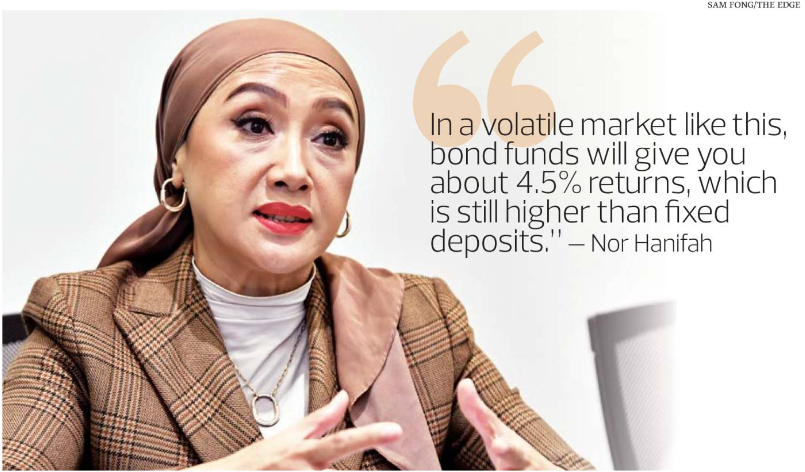
BIX ARTICLE
Franklin Templeton: Bond market in good shape due to increased volatility, global risk-off mood
Aug 19, 2024
|
7 min read
Featured Posts
Social Bonds Illustrative Use-Of-Proceeds Case Studies Coronavirus
Jul 06, 2020
|
2 min read
Sustainable Banking Network (SBN) Creating Green Bond Markets
Jul 06, 2020
|
2 min read
Why is Inflation Making a Big Comeback After Being Absent for Decades in the U.S.?
Mar 24, 2022
|
7 min read
SC issues Corporate Governance Strategic Priorities 2021-2023
Mar 29, 2022
|
3 min read
A widely expected US interest rate cut next month could also be a turning point for bonds as, historically, bonds perform well when interest rates are cut, according to Franklin Templeton head of Malaysia and CEO Nor Hanifah Hashim.
"The 10-year MGS (Malaysian Government Securities) had been trading range-bound at 3.8%, but last week [during the global rout] it broke that range to a low of 3.66%.lt is a big movement for us, and you can see the market demand for MGS," she tells The Edge in an interview.
She highlights that the bond market will benefit from the volatility in the equity market, especially after the global rout resulting from the unwinding of the yen carry trade and US growth concerns.
Nor Hanifah, who is also head of Malaysia fixed income and sukuk at Franklin Templeton Fixed Income, observes that the encouraging demand for local bonds has been driven by a surge in foreign investors' confidence in Malaysia's execution of fiscal reforms and growth plans.
She stresses that the country now has a "good story" to tell foreign investors in terms of the execution of government policies and fiscal reforms, such as the recent diesel subsidy rationalisation move. Next to watch will be the removal of subsidies or rationalisation of prices for RON95 petrol. According to Minister of Finance II Datuk Seri Amir Hamzah Azizan, the government is in the midst of ironing out details for this.
Apart from that, the ringgit's recent gains have contributed to the strong inflow of foreign funds into the local bond market.
"As long as our country's fundamentals are there and we show that we are executing the [reform] plans, then the ringgit appreciation is going to be sustainable," Nor Hanifah says.
The ringgit strengthened to a high of 4.40 against the us dollar early this month, the strongest in more than 15 months. Year to date, the local currency has gained 3.4% to trade at 4.4320 last Thursday, making it the· best-performing currency in the region.
Foreign investors returned to Malaysia's bond market in July, recording their highest net purchases in a year at RM7.8 billion, compared with a net outflow of RM600 million in June. This surge was largely fuelled by increased investments in MGS.
Kenanga Research highlights that Prime Minister Datuk Seri Anwar Ibrahim's recent announcement of Malaysia's bid to join BRICS (an intergovernmental grouping that comprises Brazil, Russia, India, China, South Africa, Egypt, Ethiopia, Iran and the United Arab Emirates) attracted RM2.9 billion in inflows on July 30 and 31.
As a result, total foreign debt holdings rose to RM279.1 billion in July from RM271.3 billion in June, with the share of total outstanding debt rising to 13.5% from 13.2% in June.
Nor Hanifah anticipates more foreign inflows into MGS, which saw foreign holdings hit a peak of more than 50% in July and October 2016. The most recent foreign holdings of these securities was at 34% in July, versus 33% in June and 32% in May.
-yield-vs-MSG-yield.png)
She believes government-linked investment companies' (GLICs) mandate to focus more on domestic investments will help the development of the local bond market.
The country's six main GLICs - Khazanah Nasional Bhd, the Employees Provident Fund, Retirement Fund Inc, Permodalan Nasional Bhd, Lembaga Tabung Haji and the Armed Forces Fund Board - recently pledged RM120 billion in direct domestic investments over the next five years under the Government-Linked Entities Activation and Reform Programme, or GEAR-uP programme, led by the finance ministry. The proposed investments are targeted at "high growth, high value" industries such as energy transition and advanced manufacturing, especially in the semiconductor sector.
For Franklin Templeton Malaysia,55% of its assets under management are invested in equities and the balance in fixed income. As at July 31,2024, its assets under management amounted to over US$8 billion (RM35.4 billion).
Gradual US easing
Although the US Federal Rese1ve (Fed) is expected to kick-sta1t the easing cycle after holding the policy rate unchanged at 5.25%-5.5% for more than a year, Nor Hanifah believes that the higher-for-longer interest rate environment will continue for some time as the Fed rate cuts are expected to be gradual. This is given expectations that the us economy will not fall into recession, but could face a soft landing.
"Our fixed income team anticipates a cut of 25 basis points in the us in September. We feel that the following cuts will be gradual and the policy rate will still be above 4%," she says.
The US economy grew at a higher pace of 2.8% in the second quarter of this year, as a result of solid gains in consumer spending and business investment. However, as inflation pressures subsided, expectations of a September interest rate cut remain intact.
As such, Nor Hanifah notes that funds will flow into the emerging markets, including Malaysia. "So I think demand for local bonds will continue."
For Malaysia, she foresees no change to the overnight policy rate of 3% for the rest of the year because inflation remains in the range of 2.1% to 3.6%, as projected by the central bank.
"At 3%, the monetary policy is still accommodative;' she says.
Bank Negara Malaysia is scheduled to hold its next Monetary Policy Committee meetings in September and November. The country's headline inflation remained steady in June, with the consumer price index rising 2% when compared with the same month in 2023,driven by higher prices at restaurants, and costlier utilities and food, though the rate came in lower than expected.
Other key market risks include uncertainties on the geopolitical front as well as the US presidential election in November, which could lead to changes in government policies, Nor Hanifah notes.
On the corporate bonds front, she says there has been a tightening of the credit spread in corporate bond yields, as a result of strong market demand since last year.
"Historically, the credit spread is at the lowest that I have seen. Not just here, but it is happening globally;' she says, adding that the tightening trend has stabilised.
RAM Ratings' data shows that the gross issuance of corporate bonds amounted to RM51.6 billion for the first half of 2024, compared with RMS2.4 billion in the same period last year. Sectors that recorded the highest issuance were financial, energy and utilities, real estate, public administration, and transport and storage.
Retail investors advised to deepen exposure in bonds
Although the bond market has always been dominated by institutional investors, Nor Hanifah advises retail investors to take on more credit risk for potentially higher returns with bonds.
"In a volatile market like this, bond funds will give you about 4.5% returns, which is still higher than fixed deposits. And I think, now, the fees are very competitive. There are many ways to access the bond market for retail investors; [they] just have to see what their risk appetite is.

"The bond market gives investors a good opportunity to earn stable returns. I hope, one day, retail investors will be more comfortable with investing in bonds, and they cannot say they do not have information anymore."
It is worth noting that in May this year, the Securities Commission Malaysia launched an ambitious plan that aims to help small and mid-sized companies raise RM40 billion from the capital markets by 2028. One of the initiatives is to facilitate the use of bonds as a fundraising instrument by addressing the barriers of bond issuances, such as insufficient scale, high costs and disclosure requirements.
Source: Lee Weng Khuen (2024, August 19). Franklin Templeton: Bond market in good shape due to increased volatility, global risk-off mood. The Edge Malaysia, pp. 32
Disclaimer
The information provided in this report is of a general nature and has been prepared for information purposes only. It is not intended to constitute research or as advice for any investor. The information in this report is not and should not be construed or considered as an offer, recommendation or solicitation for investments. Investors are advised to make their own independent evaluation of the information contained in this report, consider their own individual investment objectives, financial situation and particular needs and should seek appropriate personalised financial advice from a qualified professional to suit individual circumstances and risk profile.
The information contained in this report is prepared from data believed to be correct and reliable at the time of issuance of this report. While every effort is made to ensure the information is up-to-date and correct, Bond and Sukuk Information Platform Sdn Bhd (“the Company”) does not make any guarantee, representation or warranty, express or implied, as to the adequacy, accuracy, completeness, reliability or fairness of any such information contained in this report and accordingly, neither the Company nor any of its affiliates nor its related persons shall not be liable in any manner whatsoever for any consequences (including but not limited to any direct, indirect or consequential losses, loss of profits and damages) of any reliance thereon or usage thereof.
YOU MAY ALSO LIKE
ARTICLE
Feb 12, 2026
|
4 min read
ARTICLE
Feb 06, 2026
|
3 min read
ARTICLE
Jan 29, 2026
|
3 min read
ARTICLE
Jan 26, 2026
|
7 min read


